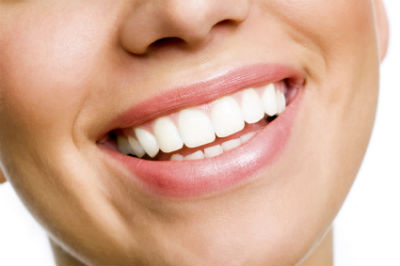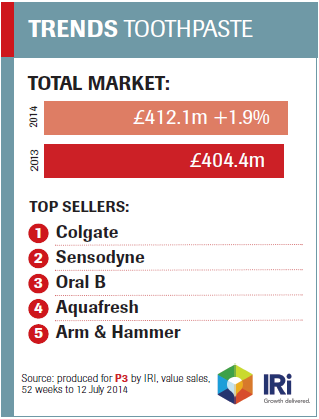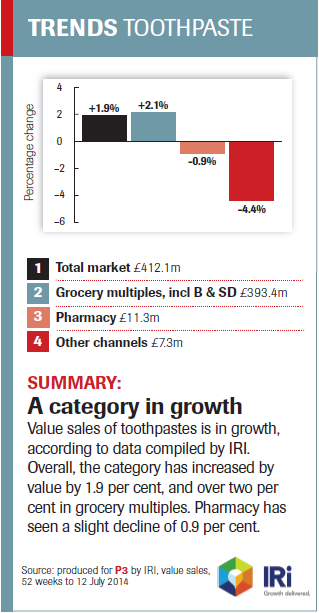For a healthy smile
In Insight
Follow this topic
Bookmark
Record learning outcomes
 Oral care is experiencing healthy growth €“ improve your share of the category and educate more of your customers on the importance of good oral hygiene
Oral care is experiencing healthy growth €“ improve your share of the category and educate more of your customers on the importance of good oral hygiene
Oral care is enjoying healthy growth, up four per cent in the last two years, with sales mostly driven by mouthwash and dental accessories/denture products, according to Mintel. The analyst predicts that by 2018 the market will grow by 21 per cent to £1.2 billion. Own label sales have contributed to growth, accounting for 51 per cent of launches in 2013 and the own label dental accessories sector also saw sales rise by 19 per cent. Toothpaste sales, worth over £400 million across the total market, have grown by almost two per cent in the past year, according to market analysts IRI.
Despite IRI data indicating a small negative variation in value sales for toothpastes (see graph), the sector is strong for pharmacy, says Jacki Beesley, Numark's retail marketing executive, with 5.5 per cent of all GSL sales for Numark members' pharmacies being oral care products. 'It's easy to think that oral care is better placed in dentistry, but pharmacy is one of the first places that people will come for advice. Although dentists can give expert advice on teeth and oral hygiene, pharmacy is in a prime position when dealing with different conditions that affect the mouth €“ and not everyone has a six-month check-up, so pharmacy can play an important role in picking up those who don't.'
Build a stronger category
 Many pharmacy teams have recognised the potential for building a stronger oral care category in community pharmacy.
Many pharmacy teams have recognised the potential for building a stronger oral care category in community pharmacy.
Lila Thakerar, pharmacist at Shaftesbury Pharmacy in Harrow, offers this advice on improving sales: 'When you're presented with a dental prescription, use the opportunity to take your customer over to your dental category. Talk to them about flossing, mouth washes, different pastes and brushes. It's a great chance to make link sales and improve dental health education.'
Ms Beesley suggests that working collaboratively with dental colleagues through LPCs and local dental committees works well. 'You can signpost each other's services and run joint health promotions.' She also has this advice on how to maximise your category in-store:
- 'It's important that your oral care fixture has appropriate space association in line with sub category share. Consider the breakdown of the different sub categories such as denture products and toothpaste
- Use brands synonymous with oral care to help signpost the category. Your oral care section should reflect products that not only sell well, but will deliver profit and value to your pharmacy. Our recommendation is to stock a brand leader and an own brand for each
- We recommend splitting toothbrushes and toothpastes by denture care; the profile of the customer buying denture products will be older, so positioning them in an accessible place meets their needs
- Merchandising children's oral care products together and at eye level can help drive sales through customer interaction.' Louise Jordan at Anglian advises that pharmacies should take the category seriously: 'Customers are time poor, so have a wide array of different products as opposed to many varieties of one product. Cater for a range of uses in one area.'
At Meda Pharmaceuticals, head of OTC, Neil Lawrence, says: 'Range of offer is key. Children and teens are becoming increasingly health conscious and no less so in oral care. Similarly, the population is increasingly elderly and there is a growing demand for denture products. Don't view oral care as a minor addition to your pharmacy. It requires focus in terms of visibility, educational materials and staff training.'
Mhari Coxon, registered dental hygienist and senior professional relations manager for Philips Oral Healthcare, agrees: 'Make sure you have the latest products available with a range of price points and ensure all staff are fully trained on electrical products so they can explain the benefits to customers.'
Improving the nation's teeth
While children's oral health has improved greatly over the past 20 years, 27.9 per cent of five-yearolds in England still have tooth decay, and it's the most common reason for hospital admission among five- to nine-year-olds.
Some 83 per cent of adults have some degree of gum disease, and with more of us keeping our teeth for longer, it's likely to become a growing problem.
A big part of the problem is that 73 per cent of us ignore the impact diet can have on oral health, with 32 per cent of us unaware of the relationship between diet and oral health, according to the British Dental Health Foundation (www.dentalhealth.org).
 'As a nation, we have turned from three square meals a day to seven to 10 snack attacks, and this may be one reason why improvements in dental health have been slowing down,' says Dr Nigel Carter, chief executive of the BDHF.
'As a nation, we have turned from three square meals a day to seven to 10 snack attacks, and this may be one reason why improvements in dental health have been slowing down,' says Dr Nigel Carter, chief executive of the BDHF.
'Frequent consumption of sugary foods and drinks is the biggest cause of tooth decay. The pharmacist has a vital role to support the education being given in the dental practice by reinforcing healthy eating messages with reduction of sugar consumption and providing and recommending a range of fluoride toothpastes and toothbrushes.' The BDHF recommends that we all choose sugar-free snacks such as cheese, breadsticks, raw vegetables and try to eat sugary foods all together at meal times, not spread over several hours during the day.
'A basic message to give the consumer is brush for two minutes twice a day, using a fluoride paste. The pharmacy should stock pastes containing the right amount of fluoride €“ at least 1,000ppm for children under three and 1,350 to 1,500ppm for everyone over three,' advises Dr Carter.
Top tips to pass on to customers are:
- Place the brush head against your teeth, then tilt the bristle tips to 45 degrees against gum line. Move the brush in small circular movements on all surfaces of each tooth
- Brush the outer surfaces of each tooth
- Use same method on the inside surfaces of all teeth
- Brush the biting surfaces of teeth
- To clean inside the surfaces of the front teeth, tilt the brush vertically and make several small circular strokes with the front part of brush
- Clean between the teeth with interdental brush or floss
- Use mouthwash
- Chew sugar-free gum containing xylitol for 10 minutes after eating.
Ms Thakerar also suggests: 'Talk about diet and sugar content and the effect on teeth. Suggest brushing after meals where possible. If that's not possible, customers can carry mouth wash or floss to use during the day.'
Innovation
Oral B's Smart Series power toothbrush has Bluetooth 4.0 connectivity, allowing the brush handle to communicate with an Oral-B app to track real-time brushing progress and offer personalised brushing programmes and improve brushing times.
Gareth Barker, Oral-B UK brand leader says, 'Until now, people could only hope that they were sufficiently caring for their teeth and gums between dental appointments. But this new innovation gives users unprecedented control over their oral care and, in turn, the outcome of their dental appointments. We believe the Oral-B Smart Series interactive electric toothbrush with Bluetooth 4.0 connectivity will have significant impact on the future of personal oral care, helping people to brush for longer, miss fewer hard-to-reach areas, and improve their overall dental hygiene.'
The brand has also recently introduced a new Oral-B Cross Action brush, with a focus on removing plaque, Oral-B Pro-Expert Deep Clean toothpaste, for a deep clean, and Oral-B 3D White Luxe Glamorous Shine whitening toothpaste. Oral-B Pro-Expert Deep Clean toothpaste is formulated to include soluble fluoride, stabilised stannous, an antibacterial agent, and polyphosphate to counter stains and tartar.
Philips has introduced DiamondClean electronic brush to remove up to seven times more plaque than a manual brush and improve gum health in just two weeks. Using sonic technology, it is described as using a powerful yet gentle cleaning action. The diamond cut brush head has 44 per cent more bristles than Philips' standard brushes.
Also new is Philips Sonicare Airfloss, a quick solution for those who don't like flossing. It uses microburst technology, dispensing rapid bursts of air and water droplets between teeth to force plaque and bacteria out. It claims to improve gum health by up to 75 per cent in four weeks.
Meda Pharmaceuticals has appointed Ethicoe Sales Management as sales distributor for its new CB12 range for the independent pharmacy sector. CB12 is a long-lasting mouth rinse proven to eliminate and control bad breath for up to 12 hours. CB12 Boost is a new two-layer sugar-free gum to prevent bad breath and provide a burst of minty flavour that lasts several hours. CB12 also contains fluoride.
TePe is repackaging its interdental brush brand with a clean, modern design this summer. The new 'shelf ready pack' makes for quicker, easier restocking of display.
Bonjela Junior has been designed to relieve pain associated with mouth ulcers caused by orthodontic devices as well as general mouth ulcers and teething. It contains lidocaine hydrochloride and is suitable from three months.
Janina has extended its range of whitening toothpastes with the addition of Maxiwhite Super Strength Whitening toothpaste, which contains bromaine complex for low abrasion whitening and hydroxyapatite, a gentle whitening agent. Also from the brand is Enamel Repair Whitening toothpaste, developed to protect teeth from demineralisation and enamel corrosion while gently whitening.
Spot the signs of mouth cancer
'We know from our own research that one in six people is likely to visit their pharmacy first to seek help about oral issues, most notably mouth cancer. This means it's really important that everyone within the pharmacy knows the warning signs,' says Dr Nigel Carter of the British Dental Health Foundation.
'One of the leading enquiries pharmacists have to deal with is regards uncomfortable, often painful, mouth ulcers. It's important to ask the customer how long they have had the ulcer before selling any cream or gels to treat it. If the answer is three weeks plus, refer them urgently to their dentist or GP.' Other signs to watch for include red and white patches in the mouth, unusual lumps or swellings.
- Mouth Cancer Action Month is in November. More than 6,500 people will be diagnosed with mouth cancer this year in the UK, says the BDHF. www.mouthcancer.org
Fluoridation update
NHS England could save at least £4 million a year on hospital admissions for tooth decay if water fluoridation was extended to areas with high levels of decay, according to research published in the British Dental Journal.
The report found that 28 per cent of fiveyear- olds and 21 per cent of 12-year-olds had no decay in fluoridated areas, compared to those with no water fluoridation schemes.
BDA's scientific advisor, profession Damien Walmsley, said: 'It's a shocking fact that more than 25,000 young people in England last year suffered such poor dental health that they had to have teeth removed under general anaesthetic in hospital.
'Fluoridation not only reduces the need for this painful procedure, it can also reduce the dental health gap between children from socially disadvantaged and affluent backgrounds.'
Comment
 Bina Patel, Kalsons Chemists, Essex 'We have a lot of people asking about sore throat and dry mouth due to the drugs they are taking. We also deal with a lot of patients suffering from gum disease and abscesses who are either seeking treatment after going to the dentist or who don't have a dentist, or they have come straight to us at the weekend. I've tried to take my knowledge that little bit further. It means that you can offer holistic care to the patient and perhaps offer them two or three appropriate products that will deal with all of their symptoms rather than just the main one. Ideally, it is the cause of the problem that we should help the customer to identify, not the symptoms, to help them avoid having it again in future.'
Bina Patel, Kalsons Chemists, Essex 'We have a lot of people asking about sore throat and dry mouth due to the drugs they are taking. We also deal with a lot of patients suffering from gum disease and abscesses who are either seeking treatment after going to the dentist or who don't have a dentist, or they have come straight to us at the weekend. I've tried to take my knowledge that little bit further. It means that you can offer holistic care to the patient and perhaps offer them two or three appropriate products that will deal with all of their symptoms rather than just the main one. Ideally, it is the cause of the problem that we should help the customer to identify, not the symptoms, to help them avoid having it again in future.'
 Nemesh Patel, AMG Pharmacy, Braintree 'The pharmacy is often the first place a patient comes for help with oral health, as not everyone has the recommended six-month check-up at the dentist. We give this category plenty of space and use brands synonymous with oral care such as Oral-B and Colgate to help signpost the display. Stocking a variety of products encourages customers to purchase. Dental prescriptions and smoking cessation give good opportunity to discuss dental related products. Our pharmacy takes pride in taking a proactive role in infant and childhood dental health. We merchandise children's oral care items together and at children's eye level, as children can have a strong influence over these purchases.'
Nemesh Patel, AMG Pharmacy, Braintree 'The pharmacy is often the first place a patient comes for help with oral health, as not everyone has the recommended six-month check-up at the dentist. We give this category plenty of space and use brands synonymous with oral care such as Oral-B and Colgate to help signpost the display. Stocking a variety of products encourages customers to purchase. Dental prescriptions and smoking cessation give good opportunity to discuss dental related products. Our pharmacy takes pride in taking a proactive role in infant and childhood dental health. We merchandise children's oral care items together and at children's eye level, as children can have a strong influence over these purchases.'
 Pallavi Dawda, Masons Chemists, Coalville 'Outside of medicines, this is the category where we carry the biggest range in our pharmacy. Supermarkets and discount stores stock a range of toothpastes and brushes at prices that pharmacy struggles to compete with. For this reason, our focus is on specialist toothpastes for specific issues such as ones that are fluoride free and targeted at sensitivity. Brushing teeth alone is not the best way to maintain a healthy mouth and gums, so I advise on a complete oral hygiene programme, including routine cleaning of the tongue surface and between the teeth, with either floss or tape or interdental brushes. This category also relies heavily on advice, so it is important to make sure that staff are confident in dealing with oral hygiene-related requests
Pallavi Dawda, Masons Chemists, Coalville 'Outside of medicines, this is the category where we carry the biggest range in our pharmacy. Supermarkets and discount stores stock a range of toothpastes and brushes at prices that pharmacy struggles to compete with. For this reason, our focus is on specialist toothpastes for specific issues such as ones that are fluoride free and targeted at sensitivity. Brushing teeth alone is not the best way to maintain a healthy mouth and gums, so I advise on a complete oral hygiene programme, including routine cleaning of the tongue surface and between the teeth, with either floss or tape or interdental brushes. This category also relies heavily on advice, so it is important to make sure that staff are confident in dealing with oral hygiene-related requests
